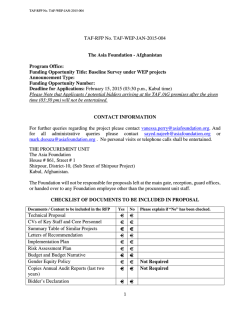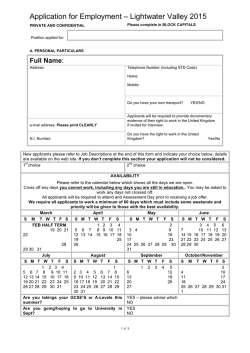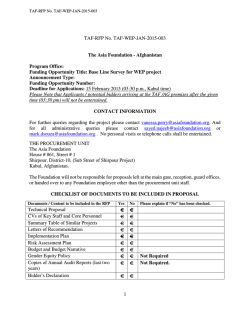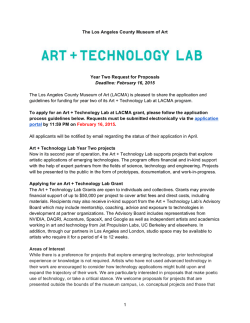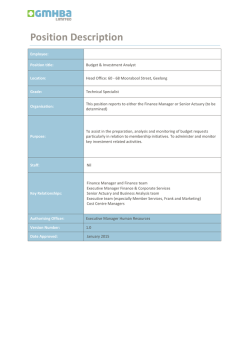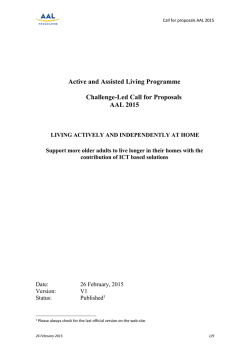
UK Futures Programme Competition brief: Skills for
UK Futures Programme Competition brief: Skills for Innovation in Manufacturing January 2015 The UK Futures Programme – competition brief: Skills for Innovation in Manufacturing Summary The UK Commission for Employment and Skills (UKCES) invites new and ground breaking proposals to boost the skills and business practices needed to maximise the value of UK innovation. This competition focuses on the range of non-technological/ STEM skills required to manage and commercialise innovation. We are looking for employer-led proposals from companies of all sizes, in the manufacturing sector, to run initiatives lasting 12 months. Proposals must be joint investments, with employers investing in cash, in-kind, or both, alongside a maximum government contribution of £150,000 per project. The deadline for submission of proposals is midday on Wednesday 11 March. Interviews for short listed applications will take place on 29 April, 5 and 6 May. Successful applicants will be informed by the end of May 2015 with projects expected to start in June 2015 and complete in June 2016. This document outlines the nature of the UK Futures Programme Skills for Innovation competition. It should be read alongside the ‘The UK Futures Programme: an introduction’ and accompanying guidance for applicants (see end). The challenge The UK has risen up the Global Innovation Index in recent years, moving from 14th in 2010 to second place in 2014. It also ranks second in the world for investment in knowledgebased capital. This is encouraging because innovation is vital for our national prosperity due to its critical role in productivity and job creation. There is broad consensus that securing the increases in productivity required for sustainable growth in a post-industrial economy requires innovation in the broadest sense. This progress reflects world-class strengths in aspects of our innovation and science systems and these demonstrate a breadth of research excellence from the outstanding quality of UK higher education institutions and a competitive business environment. However, an assessment of the UK’s science and innovation system identified planning, recruiting, training, retention, progression and performance management of people as one of the weakest parts of the system with worrying deficiencies in basic skills, STEM skills and management. There is also an under-use of existing skills across the economy. The economic benefits of innovation are realised through businesses so the skills, workplace practices, and management at play within them are critical to ensuring the value of innovation is maximised. Broadly speaking, what we mean by innovation is the organisational or commercial application of creativity in new ways for new ends. Businesses understand innovation as the introduction of new or significantly improved products, processes and services or as entirely new ways of doing business within the organisation itself or within the markets they compete in. Innovation may be radical or a gradual undertaking. It is pervasive throughout the economy, occurring in all sectors and markets to different degrees. The fundamental driver behind any innovation process is the human factor associated with it - the skills and talents of people. It is the skills required to take an innovation through to market success which this competition focuses on. To successfully innovate requires a diversity of skills. The combination of these skills will exist to varying degrees in a team, and they are required to varying degrees, in the skillsets of individuals to do their job. This is particularly relevant in smaller organisations where resources, like money and people, are at a premium. Through our research and consultation with key stakeholders we have identified that there has been less of a focus on those skills which support the innovation process, aside from technological skills (i.e. Science, Technology, Engineering and Maths – STEM). Such skills include those required to undertake the management of the innovation process and then commercialise an innovative product or service. It is in these non-STEM skill areas which are the focus of this competition. The Opportunity The UK Futures Programme invites proposals for co-funding from employers in the manufacturing sector to design or pilot new ways of boosting the skills and business practices needed to maximise the value of UK innovation. Our focus is on the workplace practices concerning how staff are developed, engaged and deployed to support innovation. Solutions should focus on the skills required to undertake and support the management and commercialisation of innovation, not technological skills. We are looking to invest in projects at the development (progressing/refining existing ideas), piloting (small scale ‘real world’ piloting and evaluation of outcomes) and scaling (growing/spreading of a practice/ idea/product) stages. A range of skills, beyond STEM, are imperative for successful innovation in organisations. A lack of effective management is often cited as a significant obstacle to the success of high growth firms. Equally, an understanding of how businesses and markets operate is necessary to be able to successfully exploit the commercial value of innovation. The ability to communicate information, thoughts and opinions effectively is also vital for attracting funding, marketing and encouraging collaboration within other firms. We would not seek to prescribe solutions to the problems identified, however, some of the areas in which we might expect solutions to be developed include: •• Innovation-relevant management development. Skills which are imperative for successful innovation in organisations include strategic management, planning and organisation, risk and project management and communication skills for internal and external audiences. •• Innovation-relevant commercialisation development. Addressing skill deficiencies to support the commercialisation of innovation could include the management of intellectual property, marketing, financial competency, attracting/accessing finance etc. •• Recruitment, retention and career pathways. Solutions in this area could involve re-designing the way in which staff required for the innovation process are recruited, retained and progressed to support the management and commercialisation of innovation, such as by promoting on management ability and potential rather than technical ability, or designing career paths which are shaped by required levels of innovation leadership. •• Job design. Self-governing teams with autonomy on decision making, flexible working and progression routes (linked to talent management) are all wider aspects of job design that could be applied. These support the creation of opportunities to deploy existing and enhanced skills and experience. •• Incentivising innovation. Implementing management and workplace practices which support an organisational ethos of encouraging idea exploration, tolerating and accepting risk and failure, and learning from these experiences, would encourage innovation within the workplace. For instance, this could mean creating the right environment and structure to foster ‘intrapreneurialism’, whereby employees can develop the entrepreneurial spirit to drive innovation. •• Broader Organisational Strategy. In order to maximise the value of potential innovations that an organisation produces, it needs to understand the entire process of innovation so it can successfully explore and exploit ideas. Implementing a broad organisational strategy outlining a clear process of how the organisation manages innovation, and formal processes for testing out new ideas would ensure clarity for senior management and staff. Developing a long-term innovation strategy also acknowledges the provision of sufficient time for potential innovations to be developed. These solutions could be delivered, for instance, by new or enhanced collaborations between employers, between employers and education providers or with other partners. Projects could be focussed on: • introducing new training for staff, line and/or senior managers; • the development of organisational structures and processes; • facilitating work placements or sharing staff between organisations; • mentoring, coaching, peer-to-peer learning; • building new or developing existing employer networks to address the Skills for Innovation challenges highlighted in this brief; • developing or adapting tools and techniques for restructuring innovation management, aligned to broader organisational strategy. But these are just suggestions. Proposals should not be constrained by the examples given. A principle of the UK Futures Programme is that it should be a test-bed for employer-devised solutions to the challenges identified in each competition. Therefore, its purpose is to encourage experimentation in and the development of workplace practices to understand what works, what doesn’t, and why in respect to solving the particular problem at the heart of each competition. The Programme will not fund existing training or management change schemes unless there is clear evidence of why and how it meets the full assessment criteria. The UK Futures Programme is most successful when a wide range of possible solutions to the problems facing employers are developed and piloted and the learning is shared with others. This is a vital expectation of all projects. Commissioner leadership The UK Futures Programme is being led by Scott Waddington, Chief Executive SA Brain and Co Ltd and UKCES Commissioner. This competition will be led by Paul McKelvie, OBE, Training and Development Professional and UKCES Commissioner. It will be managed by Paul Casey, Senior Manager at UKCES. UKCES contribution A total investment pot of up to £1 million is available for this competition across multiple projects. UKCES expects to invest up to a maximum of £150,000 per successful proposal. UKCES will invest differing amounts according to the nature of the project being proposed (i.e. development, piloting, scaling). Further information is provided in the guidance documents, a link to which is provided in the ‘Further Information and Guidance’ section below. Successful projects would be expected to start in June 2015 with UKCES funding available until June 2016, but with most of the UKCES contribution expected to be made prior to April 2016. Applicants should therefore develop their proposals with this in mind. Eligibility and Success Criteria The UK Futures Programme invites proposals for co-funding from employers across the UK from the Manufacturing sector. This competition is open to employers of all sizes. Proposals can be submitted by businesses or business representative bodies. We welcome collaboration between businesses and between businesses and other bodies. Intermediaries, such as universities, are welcome to be included in proposals because we understand that intermediary bodies may be critical to assist businesses (particularly micro and small businesses) in developing and delivering skills solutions. However, demonstrable employer leadership must be evident in every proposal. Individual businesses are also welcome to bid, but they must show evidence of wider engagement with other businesses and potential for impact beyond their organisation. The main success measures for projects are better outcomes for business (e.g. sales, productivity, profit, staff recruitment, retention and utilisation) and this must be evidenced in the logic chain when applicants submit proposals. Proposals must align with the scope of this competition if they are to pass the gateway question as part of the assessment process (application form). A clear majority of the project’s objectives and activities should be aligned with this competition brief and the output(s) of the project will address the problems/issues identified. Proposals will also be assessed against the core criteria of: • Strong employer leadership/engagement; • Innovation (in reference to the solution proposed itself); • A clear path from problem-to-solution which demonstrates the potential for impact; • Testing and sharing learning with the UKCES and other projects receiving investment through the competition; • Public and private investment – this can be cash, in-kind or both. Guidance for Applicants referenced below provides detail of the criteria. Application process The table below sets out the timetable for the competition. An application form with guidance is available from: https:// www.gov.uk/government/publications/ukces-futures-programmeskills-for-innovation-in-manufacturing-competition-brief. Activity Date Launch of competition 29 January 2015 Webinars 18 &19 February 2015 Submission deadline for applications 12pm on 11 March 2015 Interviews 29 April, 5 & 6 May 2015* Applicants informed of decisions By the end of May 2015 Projects start From June 2015 *If invited for interview, you will be asked to provide biographies of those attending, a presentation and any other requested additional information prior to interview. Further information and guidance References Further information is available from the UK Futures Programme website (https://www.gov.uk/government/ collections/ukces-futures-programme-overview). A number of key sources have informed the scope of this competition including: It is important that applicants read the suite of accompanying guidance documents: •• •• •• UK Futures Programme: an introduction Guidance for Applicants Application Form and Annexes Questions on the process and scope of the competition can be submitted via [email protected] i. BIS (DEC 2014) Our Plan for Growth: Science and Innovation. ii. BIS (DEC 2014) One third (32%) of UK productivity growth that took place between 2000 and 2008 was attributable to changes in technology resulting from science and innovation. iii. BIS (2014) Insights from international Benchmarking of the UK science and innovation system. iv. Cornell University, INSEAD, and WIPO. (2014): The Global Innovation Index 2014: The Human Factor In innovation. v. UKCES (2014) The UK Commission’s Employer Skills Survey 2013: UK Results
© Copyright 2026
